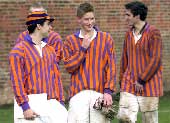|
|
| Harry, with friends, at Eton |
Athleticism in the Victorian and Edwardian Public School By J.A. Mangan, Frank Cass, $ 32.50
For those who have always held British public schools in awe, J.A. Mangan’s book will be an eye-opener. But what will come as a surprise is Mangan’s revelation that in the public schools, sports far outweighed academics in importance, especially in the Victorian and Edwardian eras.
At that time it was felt that sports taught students how to cooperate and stay loyal to the group, that it made them strong and brave, helped them make decisions and take risks, and also forced them to stick to their assigned jobs and not wander about aimlessly. All this made sports a useful tool for headmasters to enforce discipline among students. An added advantage was that it enabled young students to use their leisure hours fruitfully, where earlier they would throw stones at each other or at animals and vehicles beyond the school gates in their free time. The academically-inclined student, on the other hand, was generally the butt of jokes and ragging.
Sportsmen received favours from teachers in the public schools and were invariably elevated to ranks of responsibility, like house-captain. The younger set looked up to these sporting heroes and tried to emulate them. To make it to the school’s first XI at cricket was far more important than coming first in academics.
Mangan chooses six public schools in his study — Harrow, Stoneyhurst, Uppingham, Marlborough, Lancing and Loretto. These are, he claims, truly representative as they represent various regions and various class groupings.
The introduction of outdoor games not only encouraged students to lead healthy lives, it also taught them how to win. Consequently, indiscipline subsided and school administration improved. Teachers too were forced to take part in the games, which became mandatory for all boys. At that time, this was quite a radical innovation. Within a few decades, however, most British public schools followed suit. Thus began a revolution in school education.
To be fair, it was not the British, but the Greeks who first understood the value of sport. The British, however, adopted the idea, adapted it to their own needs and applied it in the schools as early as the 18th century.
Mangan reveals the reformatory zeal at the heart of this ideology of sport, with the help of original documents of schools and their athletics clubs. School prospectus, magazines and budgets are also reproduced to establish the importance of sports in public schools.
According to the author, one reason for the promotion of sport could be the deep-rooted Anglo-Saxon suspicion of intellectualism which, it was felt, led to self-conceit. Sports, with its ups and downs, was thought to be an ideal way to prevent exaggerated self esteem and enforce conformity and discipline. After all, learning verses and memorizing tables hardly helped to prepare a man for life after school.
By the turn of the 20th century, the rise of government-controlled schools and other socio-political changes like Britain’s diminishing importance in international politics and the emergence of new technologies, gradually diluted the importance of sport. A new breed of professionalism was now needed.
There were also educational reforms, which made the best of education available to all sections of society. The academically-minded middle-classes began to dominate. This changing scenario awakened the British public schools from their ennui. By the Sixties, the cult of athleticism began to wane and academics began to again hold sway in the schools and universities in Britain.
The book is a major landmark in the study of the ethos of sports in public schools at a very crucial time in British history.











